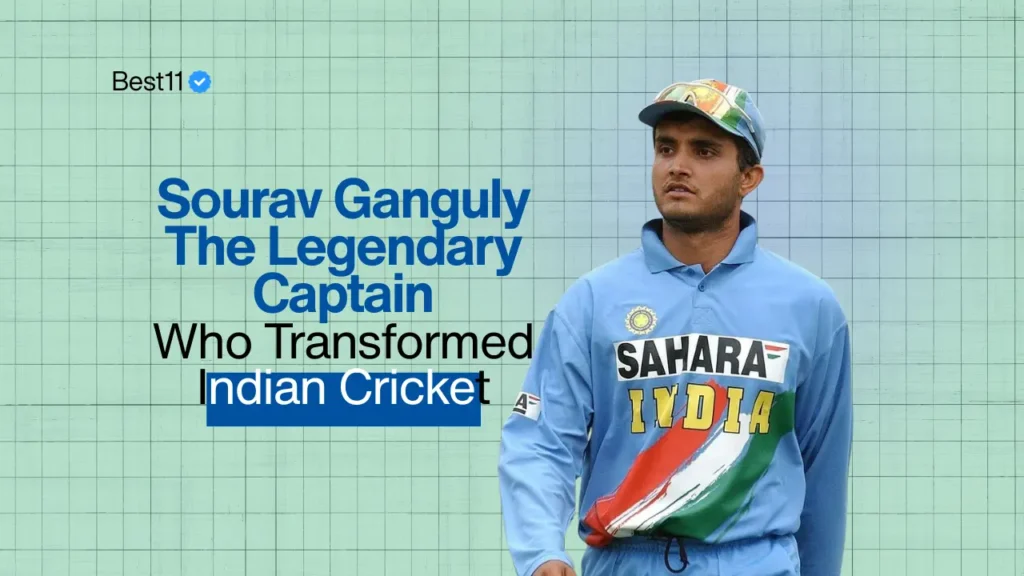Sourav Ganguly is one of the most successful captains in Indian cricket history, fondly known as “Dada” and celebrated for his “Dadagiri.” In the early 2000s, he transformed the face of Indian cricket with his passion for the game and thirst for victory, earning a special place in fans’ hearts. A magician on the off-side and a leader who loved dominating opposition teams, Dada’s career was marked by numerous highs and lows.
Ganguly made his Ranji Trophy debut in the 1990-91 season, delivering stellar performances for Bengal and leading the team to the quarterfinals. Soon after, he earned a spot in the Indian national team. In 1992, he debuted in ODIs against West Indies, but it was his only match at the time, as he was dropped following allegations of refusing to carry drinks for teammates—an accusation he later denied. Undeterred, Ganguly continued to excel in domestic cricket, amassing runs in the 1993-94 and 1994-95 Ranji Trophy seasons. These performances earned him another chance from the BCCI.
Selected for the 1996 England tour, Ganguly made his Test debut alongside Rahul Dravid at Lord’s, the cradle of cricket. In his first Test match, he stunned the world with a brilliant 131-run innings. He followed it up with another century in the third Test of the series. By the late 1990s, Ganguly’s career was soaring. In 1997, he scored his first ODI century against Sri Lanka and later set a record by winning four consecutive Man of the Match awards against Pakistan in the Sahara Cup. It became clear that India had found a batsman capable of supporting Sachin Tendulkar. During the 1999 World Cup, when Tendulkar struggled, Ganguly’s record-breaking 183 against Sri Lanka made him India’s beacon of hope—a score that remains the highest by an Indian in World Cup history.
In 2000, amidst the match-fixing scandal that rocked Indian cricket, Ganguly was appointed captain. His fearless, aggressive mindset and belief in his team’s abilities became his mantra. Under his leadership, India reached the final of the 2000 ICC KnockOut Trophy. In the 2001 Border-Gavaskar Trophy, he shattered the arrogance of an Australian team that had won 15 consecutive Tests, famously making Steve Waugh wait at the toss and responding to sledging in kind. In 2002, India won their first ICC trophy, the Champions Trophy, under Ganguly’s captaincy.
In the 2002 England ODI series, India squandered a 3-1 lead, ending in a draw. Andrew Flintoff’s shirt-waving celebration irked Ganguly. A year later, when India won the NatWest Trophy under his leadership, Ganguly famously waved his shirt from the Lord’s balcony in response—a legendary moment in Indian cricket. However, in the 2004-05 Test series against Australia, India lost 2-1, and Ganguly was portrayed as a failed captain, with his leadership questioned. In October 2005, he was dropped from the team, and Rahul Dravid was named captain. Tensions with new coach Greg Chappell escalated, with Chappell alleging in a leaked email to the BCCI that Ganguly was mentally and physically unfit to lead. Due to poor form, Ganguly was removed from the captaincy.
In 2006, Ganguly made a remarkable comeback to the Indian Test team, silencing critics with strong performances in ODIs as well, earning a spot in the 2007 World Cup team. He retired from international cricket in 2008, leaving behind a legacy of nurturing talents like MS Dhoni, Yuvraj Singh, Harbhajan Singh, Zaheer Khan, and Ashish Nehra, who became pillars of Indian cricket. Ganguly’s contributions went beyond on-field performances. He gave Indian cricket a new identity, instilling confidence to win overseas. The team he handed over to Dhoni was a product of his vision and leadership, built on supporting young talent. This team went on to win World Cups and major tournaments, elevating Indian cricket to new heights. Ganguly’s transformation of the team laid the foundation for Dhoni’s successes, and his legacy in Indian cricket endures forever.


